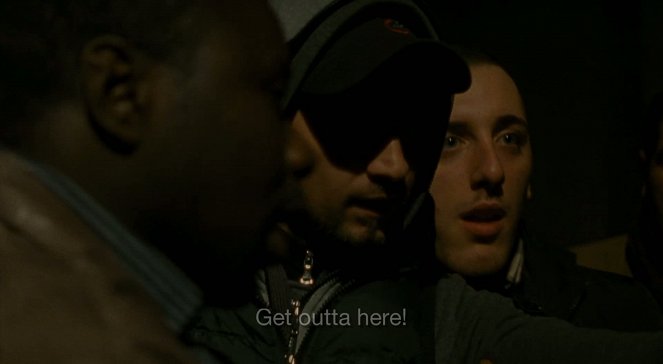Director:
Jonas CarpignanoGuión:
Jonas CarpignanoCámara:
Wyatt GarfieldReparto:
Koudous Seihon, Alassane Sy, Paolo Sciarretta, Francesco Papasergio, Pio Amato, Adam Gnegne, Mary Elizabeth Innocence, Zakaria Kbiri, Davide Schipilliti (más)Streaming (1)
Sinopsis(1)
Llegar no es besar el santo. Eso lo saben bien Ayiva y Abas, que tras sobrevivir a una peligrosa travesía por el Mediterráneo entre Burkina Faso y el sur de Italia son interceptados por inmigración, que les pone un plazo de tres meses para encontrar trabajo. Mediterranea sigue su lucha diaria por encontrar lugar en una Europa que no recibe al de fuera con los brazos abiertos, cuya imparcial observación se convierte en exaltación a lo Haz lo que debas en un estallido de violencia final, prueba de fuego para quienes se saben en un lugar mejor a pesar de todo. (Filmin)
(más)Videos (1)
Reseñas (2)
50th KVIFF – The best movie I’ve seen at the festival, guaranteed. Mediterranea attempts to objectively tell us something about the currently very interesting topic of immigrants who are fleeing from Africa to build a better life in Europe. It tells the story from the view of two different characters, which supports its objectiveness. The first one – Ayiva – is trying to function well and do everything in order to get closer to a better world. In turn, his friend – Abas – is indulging in endless depression because he doesn’t understand this world that is so different to him. He’s basically just there to complete the movie. Ayiva is the main fighter and that’s what the movie is about. The best thing is that the story is told from the very beginning till the very end; from the journey from Africa to the arrival to Italy, and then an essential chunk of the movie is set in Italy. If you put the documentary-style camerawork aside, you’ll surely be satisfied. I’m not denying that I’m giving the fifth star because of how the director ended the viewing by telling us that it’s based on a real story of an immigrant and then told us a little about him.
()
In its attempt to offer the first-hand experience of a refugee, Mediterranea is relatively successful thanks to the narrowing of the narrative perspective to the protagonist (which, in addition to the point-of-view shots and spontaneously reacting camera, is carried out by using a shallow depth of field). In addition to that, the alternating locations and imaginative work with sound (and silence) give the film a relatively brisk pace and a steady rhythm. However, the limited supply of information and the effort to be obliging toward the viewer take their toll in the form of a number of simplifications, unoriginality and the absence of a broader context, which I consider to be crucial in the thematisation of migration today. Despite the final explosion of violence (reminiscent of the conclusion of Spike Lee’s Do the Right Thing), which is of course immediately relativised by the even more brutal violence of the other side (the other transgressions of the refugees are also justified with a similar overlap of one evil with the worse evil of the previous one), it is a one-sided and black-and-white perspective with characters who are either good or bad at their core. On the one hand, this is an extremely important film that transforms fragmentary media reports into a coherent and engaging narrative, though on the other hand it could have exactly the opposite effect than the filmmakers intended due to its blatant manipulation of the viewer and leaving minimum room for discussion. 60%
()
Galería (16)
Foto © DCM



Anuncio